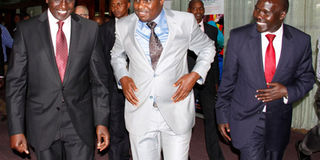William Ruto tells Africa to seal yawning gap in milk supply

Deputy President William Ruto accompanied by Agriculture Cabinet Secretary Felix Kosgey and Livestock Principal Secretary Fred Segor on September 24 2014 at the 10th African Dairy Exhibition and Conference in Nairobi .
What you need to know:
- The government will set up semen centres to double the amount available to farmers from 800,000 straws to improve breeds and raise production. The centres with liquid nitrogen will be built in Meru, Nyandarua, Eldoret in the first phase.
- The DP urged players in the dairy industry to pressure their governments to open borders.
- “We have noticed that transport and storage cost components form a huge part of the cost of semen. Going forward, we want to make the semen available and affordable to increase production,” the DP said.
Deputy President William Ruto Wednesday told African states to open up their borders for trade among themselves to close the milk deficit gaps that are currently exploited by Europe.
He said the dairy sector has great potential to transform livelihoods on the continent with the Common Market for East and Southern Africa (Comesa) having a milk deficit of two million metric tonnes that is mostly covered by imports.
He spoke during the opening of the 10th African dairy conference and exhibition at Kenyatta International Conference Centre organised by the Eastern and Southern Africa Dairy Association.
The DP urged players in the dairy industry to pressure their governments to open borders.
“Boundaries should not become hurdles but bridges that create market for the countries to enable more investments. We should read from the same script to produce more, close the deficit gap and expand markets through value addition,” he said.
The government will set up semen centres to double the amount available to farmers from 800,000 straws to improve breeds and raise production. The centres with liquid nitrogen will be built in Meru, Nyandarua, Eldoret in the first phase.
TRANSPORT AND STORAGE
The next phase will be in Voi, Sotik and Kirinyaga next year.
“We have noticed that transport and storage cost components form a huge part of the cost of semen. Going forward, we want to make the semen available and affordable to increase production,” the DP said.
The conference, which has attracted 545 delegates, was told that the dairy industry needed more investment in modern technology to meet global demand.
Mr Ruto said the Kenya Veterinary Vaccine Production Institute will turn to oil-based vaccines from water-based ones, which will reduce the cost to the farmers by 70 per cent while the Kenya Meat Commission will adopt modern machinery to improve processing.




